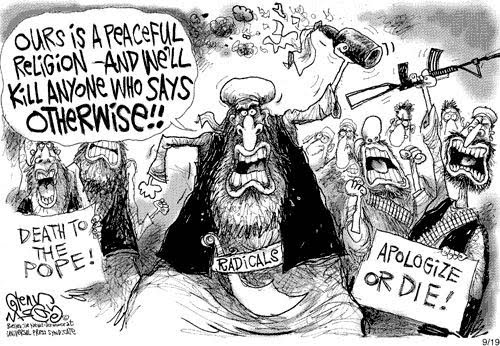Almost every terror attack is followed with some kind of deception by the apologists for Islamism and, of course, by assorted liberals. The aftermath of the Dhaka attack, and the revelation that at least one of the murderers was inspired by the Salafi televangelist Zakir Naik, is no different. A major subterfuge they have adopted now is moral equivalence: that is, the doctrine that there is no universal morality and, therefore, there can’t be any universally accepted moral hierarchy; the natural corollary of this line of thinking is that all similar actions are morally equivalent.
The fatal flaw of the doctrine is evident from not only its implicit negation of morality as such but also the terrible consequences it would lead to if it is generally accepted. A pickpocket breaks the law, and so does a murderer; thus, both are equally bad. Now at least legally the two criminals are regarded differently—all over the world. The reason is simple: the pickpocket deprives a person their money and valuables, whereas the murderer deprives them of their lives. The consequences are different, and therefore a differential between the two crimes and between their punishments is widely accepted.
It is time a similar differential was accepted between the ethical values of various human actions.
On the face of it, this seems commonsensical, but the first thing intellectuals do while taking up any issue is that they banish commonsense and reason from the context. In the present instance too they, instead of properly scrutinizing the rabid televangelist, are trying to diminish the focus on Naik. For this disingenuous enterprise, they have taken recourse to the notorious doctrine of moral equivalence.
OK, Naik is obnoxious, but what about the Hindutva lunatic fringe, they ask. Naik spreads fundamentalism but Sakshi Maharaj and Sadhvi Prachi are not exactly the champions of peace and amity, they argue. Intellectuals are right inasmuch as they point out the insufferable statements made by a few saffron hotheads are concerned. But where they go wrong, and completely off on a tangent, is when they start morally equating Muslim fundamentalists with Hindu fanatics. The two groups are not morally equivalent—for the simple reason that the consequences of their actions are not same or even similar.
But, unfortunately, intellectuals continue to equate not only the Hindutva fringe but also its core, the RSS, with the most extreme jihadist bodies like the Islamic State, al-Qaeda, and Taliban. A few months ago, the prominent historian Irfan Habib compared the RSS with the IS, something that senior Congress leader Digvijay Singh does almost every day. The comparison is odious, for there the RSS has not done anything even remotely similar to what the IS does routinely. The Sangh Parivar is not in the business of waging a violent war against non-Hindus; the IS slaughters non-Muslims regularly; in fact, it also kills Muslims in equal measure. The RSS does not indulge in sex slavery; for the IS, it is a standard practice. The RSS does not slaughter its enemies; the IS not only murders prisoners but also releases the videos of the murders. No country is waging a war against the RSS; a lot of countries are fighting the IS. There is absolutely no evidence of the two organizations being similar, and yet the canard continues to be spread against the RSS.
Similarly, the Hindutva fringe has also made mainly noises. Yes, there was the unfortunate incidence of the killing at Dadri in UP, but the facts about the murder have not come out properly. The fringe was also accused of attacking churches last year, but all accusations proved to be false. But, on the whole, the saffron brigade has not indulged in violence of such proportions that it can be compared with the IS; nor Hindutva leaders have ‘inspired’ any Hindu terrorists, if there are any.
This also brings us to the issue of Hindu or saffron terror. Liberals and Leftists lecture us all the time that no religion teaches violence, religion has nothing to do with terror, etc. All these opinions are grossly incorrect. But it is intriguing to note that even Hindutva leaders accept these misleading platitudes as gospel truths. Then they go on to claim that Hinduism is so great that it can never degenerate into terrorism.
All this is drivel, for there are religious scriptures that preach violence and they have a lot to do with terrorism. And even if a religion does not preach the extermination or subjugation of others, its followers can become terrorists. It happened in the case of Sikh terror. Sikh gurus and their scriptures nowhere promote the killing of others but a section of the community carried out horrendous acts of cruelty. Similarly, it is wrong to say that Hinduism can never produce terrorism. Even if we assume that all the cases against the saffron activists are false, there is at least one instance to prove that Hindu terror has a history—Nathuram Godse. He was indeed a Hindu terrorist.
Zakir Naik may or may not be a Muslim terrorist but it is indisputable that he has inspired his young coreligionists to kill innocent human beings; his culpability is being examined by the security and law-enforcement agencies; experts in jurisprudence will also pitch in. There is surely a need to do so. But there is no evidence to suggest that extreme Hindutva leaders have ‘inspired’ any bloodbath.
Therefore, the use of moral equivalence is disingenuous and malicious in the context of Naik.
Picture courtesy: http://carnageandculture.blogspot.in/
